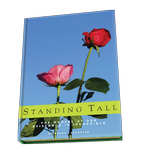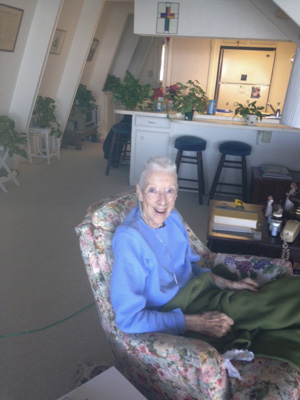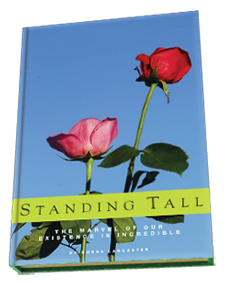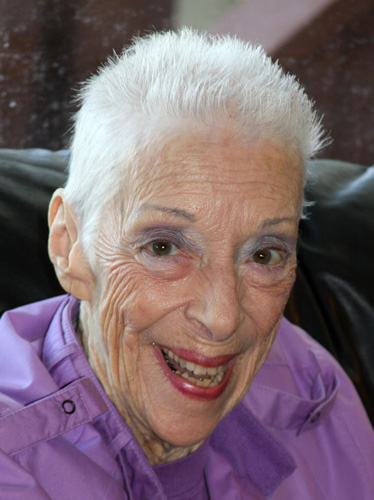What’s Going On?
August 2005
THIS MONTH’S THOUGHT:
If we want to be “safe” or “do it right” we cannot be integrated.
SCIENCE OF MAN:
Lesson Eleven (Continued from last month)
So, we have seen that what is: That we do not know the future. But, we have seen that as bad. That we ought to be able to know the future and then of course only giving it a casual look, we felt we could change the future. But, if one could foresee a given event, and then change it, one was not knowing the future.
So, what is, is living by reporting ‘what is’ to X and seeing ‘what is’ as good, or valuable or worthwhile. And X operates upon it. In this way, man recognizes his oneness with X, with Spirit. If he could foresee and could change the future and change all the events in it he would have no comprehension of X. He would never realize his oneness with X, that he was a function of X. So, ‘what is’ is so designed by an almighty loving creator that one would be given every opportunity to discover one’s oneness with X. Because one never knows the future. But regardless of what happens, if one sees ‘what is’ and sees it’s value, X operates upon it, and one sees that one does not need to know the future. That everything is an ever-changing, ever-loving panoramic of change. And one could be comfortable with change, comfortable with the unknown and recognize the oneness with X, the union with X. If one could do what the ideal says, the ‘what ought to be,’ what one has valued, one would be in a horrible state of existence. The most boring, the most tedious, the most fretful form anyone could be in. One would see the whole panoramic future and see everything and know that it was coming. You know on a given day you’re going to get burned. You know on a given day you’re going to receive news that a loved one has passed away. There’s nothing you can do. You know the future. Wouldn’t that be horrible?
So, as we begin to observe, we begin to re-evaluate what the self has said is ‘good’. Now, the self is based upon the four dual basic urges: That the whole purpose of living is to be non-disturbed; to avoid all pain, but pain is the great signal that tells us we are not reporting accurately to X, and that we’re walking into something that is destructive to the entire state of being, destroying the organism, the awareness, the whole union of X, awareness, and body, and function. Casting it asunder, and pain is the announcer that one is headed on that way. Without that pain, one would be totally insensible to everything that is destructive to the body, to the awareness, to the state of being, to existence, even. So, one begins to see that the self has accepted as good something that would be very damaging. And this is called re-evaluation.
Another thing that the self has set up as good is that one should never be ignored or rejected. But, one of the great Teachers in the Scriptures says that one should ‘Leap for Joy” when one is falsely accused and mistreated by other people. Now, if one sees this, that it gives one the awareness to see where one is. To see what one is valuing. Whether one is caught in valuing of what ought to be, the illusion, has set up an ideal of what is good, and sees no value, practically, in what is, but only in the illusion. And as one follows this, one sees that a certain amount of disapproval is also very wonderful. And that isn’t it wonderful we can’t control people. Because if we did, what kind of a creature would we be, that if we had the power to control every other person we would be setting self up as a god. And it has set itself up as a god, the god of darkness, mammon, that says what ought to be, the ideal, being what the self, from the infant decision, the four dual basic urges, from mammon, has said is good.
Now, when one sees what is, is Truth, is a fact, but one feels that what ought to be, what would be good, would be for a different fact to be in existence, one is in a state of mental conflict, mental struggle, mental resistance, emotionally all torn up, and, of course, reported to X that things are in a terrible shape, that one is in an emergency, X prepares the body to fight or run. And, of course, that is nothing to fight or run from. It is only because the self says, “What is is not good. And that what ought to be would be. So, what we’ve got to do is to change ‘what is’ into something that will be what “I” call good.” And this is the work of the self. And I observes this and sees that it is necessary to totally dis-identify from the self. And to begin to see value for I, the observer, begins to see the value in ‘what is’.
Now, before I can begin to see value in ‘what is’ and remotely begin to operate the self entirely, it must be cleansed as we have seen. So, the first thing that it will do is write down all the things that the self reports as being good. It would be good we put in the general terms to be non-disturbed, to have pleasure and comfort, to escape pain, it’s good and what ought to be for that I would have approval and escape all disapproval. And that I would have lots of attention, escape being ignored or rejected. And that I am important. That everybody is controlled by me. And I’m not inferior because nobody fails to obey me. And then, of course, that complaining would change ‘what is’ into something that would suddenly be ‘what is’ would be good of what one sees. That sticking up for rights would change ‘what is’. And that pleasing people would change ‘what is’. And that believing and doing what I’m told by authority would change ‘what is’ into something that I knew ought to be. Or that appearing to be different on the surface, putting on a different mask would change what is. Or, that by blaming something, that it would change what is. However, what is is the fact. And a fact is very difficult to argue with. But, you see, the person wants to be a magician and change what is into something different that one would call good. And as one observes, one knows very little about what is good and valuable in living experiences. One sees challenges as bad. And sees lack of challenges as good. But if those are looked at, all challenges are good. And every ‘what is’ is a challenge. And one would appreciate ‘what is’, the ever changing. Each one is a challenge or an opportunity for one to be more conscious and more aware. And to further show up the fallacy of the self– the what ought to be. And as we have seen, when we see something for an illusion we no longer are tempted to involve or to identify with that illusion. (To be continued next month)
A STORY:
For the past several decades there has been a suggestion floating around that says, “Go with the feeling.” Now, this doesn’t require much attention as I’m always feeling something. The car doesn’t start and I feel irritable. The IRS calls me in for an audit and I feel scared. Someone criticizes me and I feel defensive.
The Teaching Material says I am either self-determined or other-determined. So, who or what is in charge? The good news is that I CAN take charge of how I feel, instead of letting the feelings take charge of my behavior. The feelings are not always valid and I had better check them out before I identify with them. Years ago when Neal, my husband died, I felt like I had killed him. Was that feeling valid? Of course not.
I can choose how I want to feel, take the appropriate action and the feelings will follow. I have had it backward all my life. I have let the feelings determine how I acted. If I felt depressed, I acted depressed. If I felt like a victim, I acted like a victim. There is great danger in this. X operates on the inner state and will continue to bring me experiences to depress me or victimize me. And on and on it goes.
I first choose how I want to feel, take the appropriate action and the feelings follow. If I am grateful for the car, I will wash it and take care of it. If I am grateful for my teeth, I will floss. If I am grateful for Life, I will be thankful for all that is—every encounter and every experience. I live in a Schoolroom and Life is the Teacher and has only one purpose for me—to be conscious. So everything that happens is to teach me to be in charge of my inner state. To know, accept and live from this is, indeed, a challenge. However, it’s the only way I know of to have peace,
QUESTIONS FROM LITTLE AMERICA WORKSHOP
4/74 (Dr. Bob Gibson)
- When we have false feeling of emergency would it help to drink liquids? No, I don’t think that would help. I would say a little physical activity would be better. Haul off and hit the seat cushion next to you and call it a dirty name. If your husband gets you upset, go in the bathroom and take a wet towel and beat the bathtub up a little and call it him. So, it’s an expenditure of sudden violent energy. Get you a punching bag or a knife throwing board and paint a picture on it and name it and let it have it. It saves a lot, and it wont hurt anyone. It saves X from having to do a lot of adaptation to keep you alive. The mobilized energy has to be used up and that’s some of the ways of doing it. The sooner the better you do this after the false feeling, while you have really got the charge up—do it.
- Will laughing use up the mobilized energy? That uses some of it, but not a great amount. Violent physical activity uses the most of it. Hit something, kick it, stomp it. That’s what you wanted to do when you got man, wasn’t it?
- Some people feel they really need to go back into their whole past history and drag up all the little incidents that happened to them. Is that really part of the step to really get to know the self? That is doing it the hard way and takes many hard yeas to do what can be done in a matter of minutes. Just listen to the self a few minutes and you’re through with it. The conditioning says you have to have “more, better and different” before you are ready to do that and it will try to convince you that it’s very difficult.
- What are possessions? They are things which one claims. This is mine. Actually the awareness is a function and a function can’t possess anything. It can use all sorts of items. The Great Teacher said that unless you renounce all, you can in no wise be my student. This means that you don’t give away the house, the car, but to renounce it is to not make it important. They are something to use and to renounce is to take value away from. So possession is making something important. If we make anything important we are in bondage to it.
******
Eve to Adam. “It seemed like a good idea at the time.”



